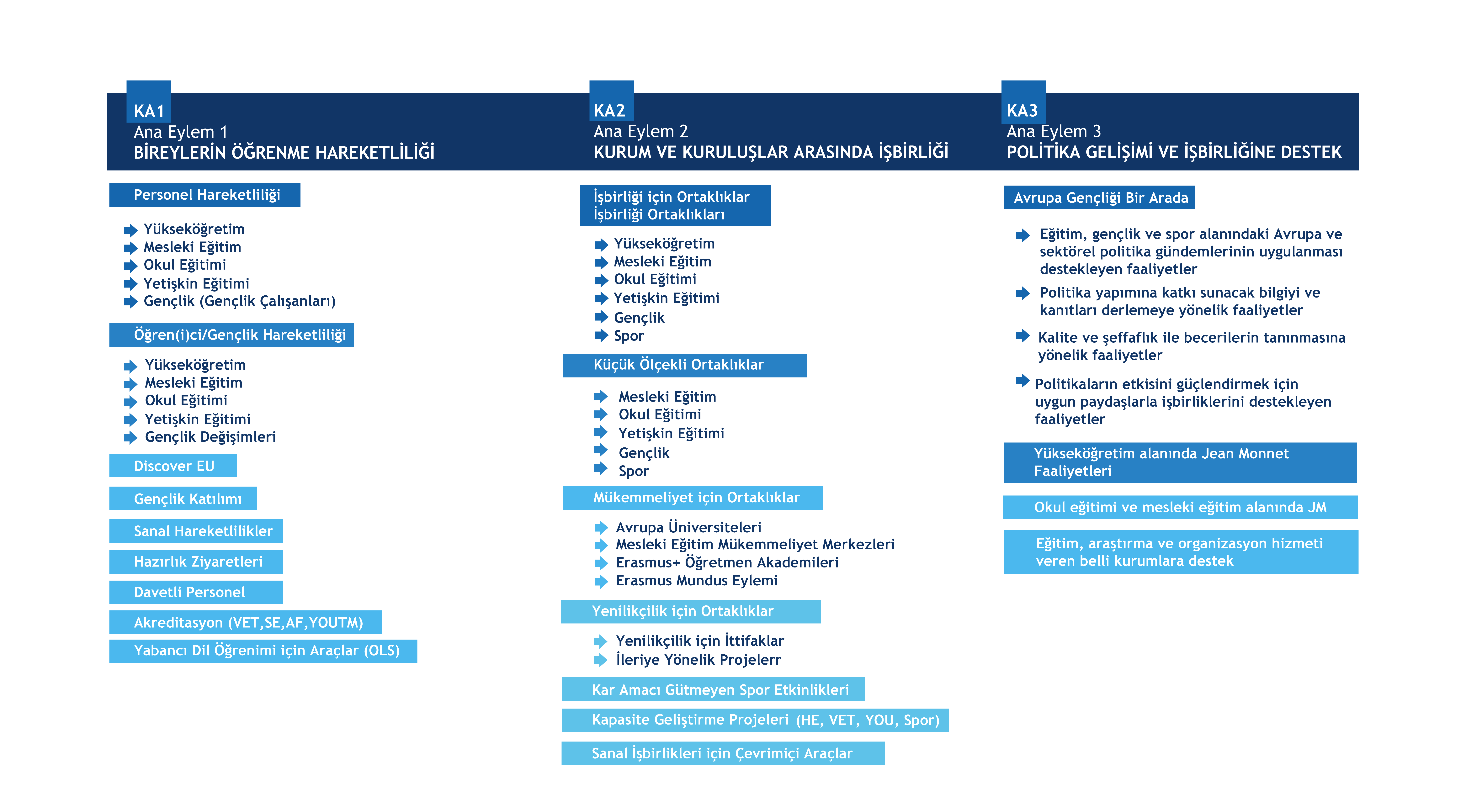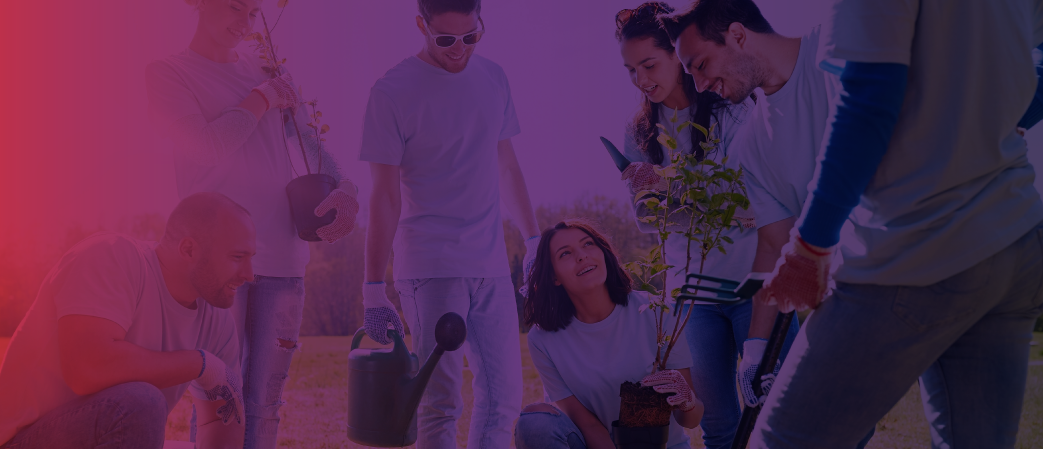ERASMUS +
Targets of the Programme
Erasmus+ that is the EU’s programme in the fields of education, youth and sports, supports education, training, internship, professional development, informal learning-based youth activities and collaborations between institutions across Europe and beyond. Aiming to modernize education, training and youth work across Europe, the Programme also aims to contribute to the development of human and social capital, which is needed by labor markets and a competitive economy.

 EErasmus+ Programme first started as a student exchange programme to encourage one or two-term exchange of higher education students in 1987. The Programme has undergone structural changes over time and has expanded to include the fields of school education, vocational training, adult education and youth, as well as student exchange. It has been implemented under different components such as Socrates, Leonardo da Vinci, and Lifelong Learning until 2013. In the 2014-2020 period, with the addition of the the sports field alongside education and youth fields it was combined under one programme and named Erasmus+. It has been decided by the European Commission that the name of the new programme that will apply to the years 2021-2027, will continue as Erasmus+. The budget of the Erasmus+ Programme has almost doubled in the 2021-2027 period compared to the previousperiod (2014-2020), reaching 28.4 billion euros.
EErasmus+ Programme first started as a student exchange programme to encourage one or two-term exchange of higher education students in 1987. The Programme has undergone structural changes over time and has expanded to include the fields of school education, vocational training, adult education and youth, as well as student exchange. It has been implemented under different components such as Socrates, Leonardo da Vinci, and Lifelong Learning until 2013. In the 2014-2020 period, with the addition of the the sports field alongside education and youth fields it was combined under one programme and named Erasmus+. It has been decided by the European Commission that the name of the new programme that will apply to the years 2021-2027, will continue as Erasmus+. The budget of the Erasmus+ Programme has almost doubled in the 2021-2027 period compared to the previousperiod (2014-2020), reaching 28.4 billion euros.
Türkiye’s Participation in the Programme
Türkiye has been participating in the EU’s Programmes in the fields of education, youth and sports since 2004.
The Erasmus+ Programme participation agreement for the 2021-2027 period was signed on October 27th of 2021 and our participation entered into force after it was published in the Official Gazette on November 16th.
The national coordinator of the Programme is the Turkish National Agency.
Horizontal priorities of the Programme to be considered in all projects in the 2021-2027 period:
Inclusion and Diversity
Sustainability, Environment and Climate
Digital Transformation
Participation in Democratic Life
International Dimension
Within the scope of the Programme, individuals from different age groups and sectors are given the opportunity to carry out education, teaching, training, internship, on-the-job training, informal learning-based youth activities and volunteer work abroad in order to develop and share their knowledge and experience. Erasmus+ is open to education, training, youth and sports organizations in all sectors of lifelong learning, including school education, vocational education, higher education, adult education, youth and sports sector. In addition to this, the Programme helps institutions and organizations to experience and implement innovative and good practices in the sectors in which they operate, to increase their institutional capacity together with their counterparts abroad, and to reach an international dimension.
Great progress has been made in the harmonization of university structures and in increasing the coherence of higher education systems, thanks to higher education mobility across Europe that has been going on for more than 30 years. Erasmus+ Programme, has been built on EU policy documents such as”Education and Training Strategic Framework”, “Commission Communiqué on the Modernization of Higher Education”, “Renewed European Cooperation Framework in the Youth Field”, “EU Youth Strategy (2010-2018)”, “White Paper on Sport”, “European Dimension in Sport” and “EU Work Plan for Sport”.
Who can benefit from Erasmus+ Programme?

University students, academics and higher education workers in the field of higher education,
Vocational school students, apprentices, professionals, educators, those working in the field of vocational education in the field of vocational education,
Primary and secondary school students, school leaders, teachers and school staff in the field of school education,
Learners, educators, members and employees of adult education institutions in the field of adult education,
Young people aged 13-30, youth workers, members and employees of youth organizations in the field of youth,
Sport-related public institutions, associations or organizations representing athletes, Olympic Committee, national sports leagues, federations, clubs, sports NGOs etc. in the field of sports.
Shortly, individuals of all ages and all walks of life and institutions and organizations from all levels can benefit from the Programme.
Structure of the Erasmus+ Programme
The Erasmus+ Programme consists of 3 Key Actions and 2 Special Actions:
- Key Action 1: Learning Mobility of Individuals (KA1)
- Key Action 2: Cooperation for Innovation and Exchange of Good Application (KA2)
- Key Action 3: Support to Policy Reform (KA3)
- Special Action 1: Jean Monnet Actions
- Special Action 2: Sport Supports

In the scope of the Erasmus+ Programme, there are “decentralised” and “centralised” activities.
- Decentralised Projects: Applications are made to the Turkish National Agency.
- Centralised Projects: Applications are made to the Education, Audio-Visual Culture Executive Agency of the European Commission in Brussels.
Current calls for proposals for all centralised calls can be accessed from the Education, Audio-Visual and Culture Executive Agency’s web-site .
Would you like to learn more?
The European Commission manages and implements the Programme through the National Agencies and the Education, Audiovisual and Culture Executive Agency. The Erasmus+ Programme is coordinated by the Turkish National Agency in Türkiye.
You can use the following platforms to start your Erasmus+ journey and establish partnerships.
You can reach up-to-date news about Erasmus+ on the Turkish National Agency web-site.
Erasmus+ Programme Year 2023 Guide
Erasmus+ Programme Regulation of Period 2021-2027
You can find the brochure of the Programme here.







